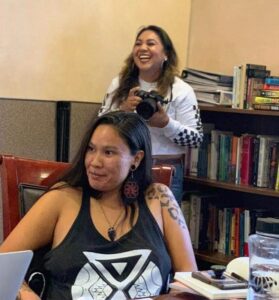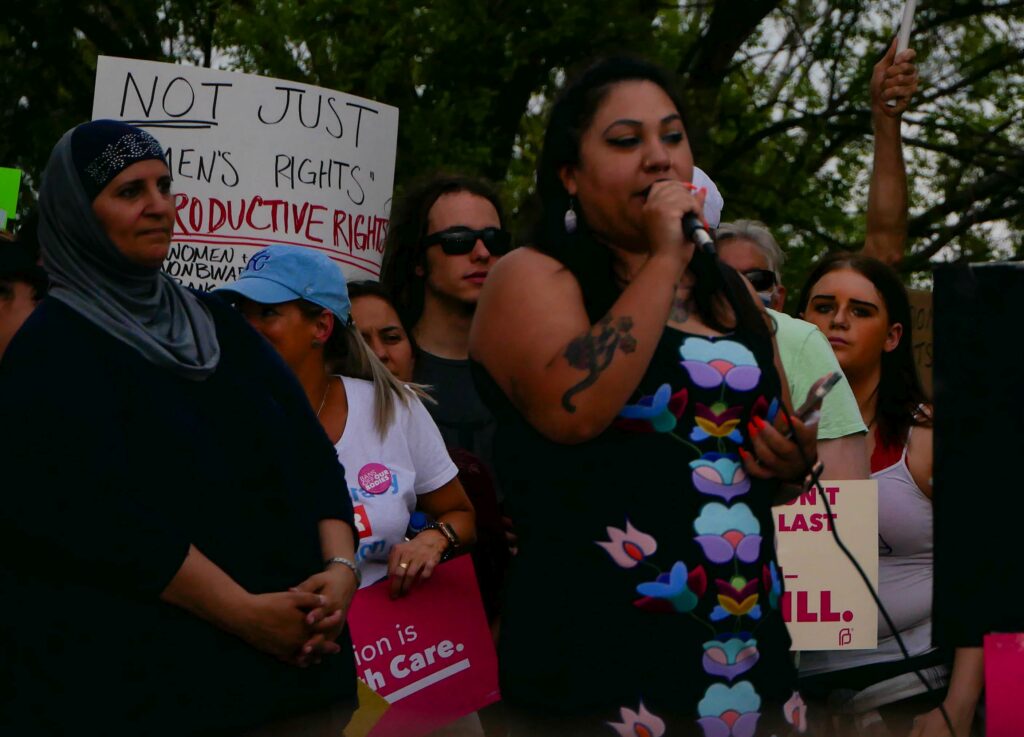ALBA/Puffin Award for Indigenous Women’s Group Defending Reproductive Rights
Fifty years after Roe v. Wade, the Abraham Lincoln Brigade Archives (ALBA) is pleased to announce that the 2023 ALBA/Puffin Award for Human Rights Activism will go to Indigenous Women Rising (IWR), which is committed to honoring Native and Indigenous People’s inherent right to equitable and culturally safe health options through accessible health education, resources, and advocacy. Following the assault against reproductive rights after Dobbs v. Jackson, ALBA and The Puffin Foundation renewed their commitment to reproductive justice, particularly in underserved communities. IWR, an Indigenous-led full-spectrum reproductive justice organization, helps Indigenous families pay for and access abortion care, menstrual hygiene, culturally sensitive education, and midwifery funding and support. The award will be presented to IWR in New York City. For more details, see ALBA’s event calendar at alba-valb.org/eventcalendar.
“The Supreme Court’s deplorable Dobbs decision that stripped away federal privacy and reproductive rights is yet another horrifying setback for those seeking to manage their own bodies and health,” said Neal Rosenstein, President of The Puffin Foundation. “But the impact of such decisions has always fallen hardest on marginalized populations. That’s why the work of Indigenous Women Rising is all the more impactful and important to support. We’re honored to be presenting this year’s ALBA/Puffin Award to them for their targeted, meaningful work that honors the inherent health rights of Native and Indigenous People.”

Nicole Martin (she/they, Co-Founder, Political Education Director), Rachael Lorenzo (they/them, Co-Founder, Executive Director)
Rachael Lorenzo, IWR’s Executive Director, started Indigenous Women Rising in 2014 as a campaign to bring attention to the fact that Indigenous women and people who rely on Indian Health Services for healthcare were being denied access to Plan B, a form of emergency contraception. “Indigenous Women Rising is honored to receive the ALBA/Puffin Award for Human Rights Activism,” said Lorenzo, who is Mescalero Apache, Laguna Pueblo, and Xicana. “Indigenous people’s rights throughout the world have been trampled by colonialism, disrupting our connections with each other, our children, our land and all other living beings. Our work is built on our own traditional Pueblo and Apache values that our matriarchs are powerful and our children are the future. Abortion has always been a part of our story and our right to our own bodies is the most sacred thing we have. We knew, based on our individual life circumstances, and the threat of war, famine, or pending migration, can alter an individual’s decision to terminate their pregnancy. It’s not so different than now. We will always make sure our people have access to the care they want, whether it’s abortion or prenatal care because we believe denying our sexual selves is inhumane.”
“IWR is tirelessly advocating and working for reproductive justice for those whose human rights have been unacceptably curtailed both before and since the reprehensible June 2022 decision,” said Jack Mayerhofer, ALBA board member and chair of the Human Rights Committee. “Due to centuries of systemic and deep-seated racism, Indigenous communities across the United States and Canada have for too long been denied the health care and justice they deserve, and this is only being made worse by Dobbs v. Jackson. We are honored to partner with an organization that so boldly combats this racism and fights for the healthcare and reproductive rights of Indigenous communities.”
The ALBA/Puffin Award for Human Rights Activism, a $100,000 cash prize granted annually, is an initiative to sustain the legacy of the experiences, aspirations, and idealism of the Abraham Lincoln Brigade. It supports contemporary international activists and human rights causes. A philanthropist and visionary, the late Perry Rosenstein created and established an endowed fund for this award in 2010. Previous awardees include investigative journalists Lydia Cacho and Jeremy Scahill; Judge Baltasar Garzón; Kate Doyle and Fredy Peccerelli, for their work exposing human rights violations in Guatemala; United We Dream, a national network of youth-led immigrant activist organizations that fight for the rights of millions of undocumented immigrants in the United States; public-interest lawyer Bryan Stevenson; Proactiva Open Arms, dedicated to rescuing migrants in the Mediterranean; the Coalition of Immokalee Workers, a worker-based labor and human rights organization founded in Florida in 1993; My Brother’s Keeper, which works to improve the health and well-being of minority and marginalized populations in the United States; and Life After Hate, which helps people leave violent far-right and white supremacist groups.
Did You Know? Women’s Reproductive Rights during Spain’s Second Republic
The proclamation of Spain’s Second Republic in April 1931 opened the door to a spate of modernizing legislation, including in the area of women’s rights. The 1931 Constitution legalized divorce, defining marriage as founded on “equal rights,” allowing for its dissolution by mutual agreement or, for cause, at the request of either of the two spouses. Divorce was further regulated in a law passed in early 1932. In 1933, women in Spain gained voting rights. In January 1937, less than seven months into the civil war, the regional parliament of Catalonia legalized the voluntary interruption of pregnancy up to 12 weeks. It was the most advanced abortion legislation in Europe at the time, as it allowed any individual to break off their pregnancy for medical, genetic, or ethical reasons.
In Spain’s national government, then led by Prime Minister Francisco Largo Caballero, the Anarchist leader Federica Montseny, who served as minister of Health and Social Assistance, pushed for the nation-wide legalization of abortion as well. Although she faced with opposition from her fellow cabinet members, she nevertheless worked to extend the Catalan legislation to the rest of the territory controlled by the Republican government.
The Republic’s defeat in 1939 turned back the clock. Divorce in Spain would remain illegal until 1982, seven years after Franco’s death; abortion would not be legalized until 1985.
Did You Know? Native Americans in the Lincoln Brigade
The close to 2,800 volunteers who joined the Spanish fight against fascism from the United States, included at least six native Americans. Charles “Blacky” William Sanborn (1902-1966), born in Pittsburgh, Pennsylvania, was in Spain from September 1937 until August 1938, serving with the XV Brigade. John William Parks (aka William Lewis Banks, 1914-1937) was born in Pennsylvania. A textile worker, he had done several years of military service before the war in Spain. Having arrived in early 1937, he was killed in February of that year at Jarama. Freeman Woodson Mani (1909-1996), born in South Dakota, was part Sioux. He served with the Lincoln-Washington Battalion from October 1937, deserted, and returned to the US in May 1938 as a stowaway. During World War II, he joined the Merchant Marine. Thomas Cox, Jr., from Alaska, was one of the older volunteers (he was 47 when he joined) and was killed at Jarama in February 1937 as well. Judson Mill Reynolds Briggs (1906-1981) was a fifth-generation member of the Seneca Nation. Born in Philly, he served as an ambulance driver with the Republican Medical Service from May 1937 until his return to the United States in March 1938. Ephraim Bartlett, a coalminer and US army veteran who was 38 when he joined the XV Brigade, served in Spain from July 1937 until July 1938.














